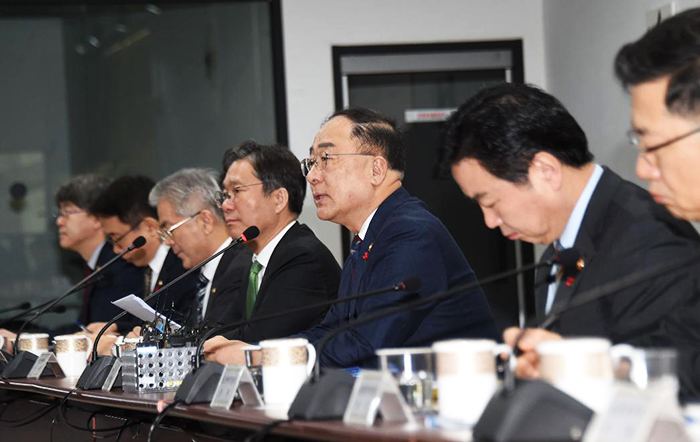
Minister of Economy and Finance Hong Nam-ki on Jan. 16 chairs a meeting on innovative growth strategies at Yangjae Innovation Hub in Seoul. (MOEF)
By Xu Aiying and Lee Hana
The government on Jan. 16 announced plans to boost innovative growth by fueling the hydrogen economy as well as through projects in big data and artificial intelligence (AI).
In a meeting at Seoul's Yangjae Innovation Hub to discuss innovative growth strategies for 2019, Minister of Economy and Finance Hong Nam-ki said the supply of hydrogen-powered cars will jump from 2,000 vehicles last year to around 80,000 by 2022.
"Our goal is to become the biggest shareholder of the world markets for hydrogen- and fuel cell-powered vehicles. We have strategies for production, storage, transportation and application to achieve this very goal," he said, adding that the final outline will come on Jan. 17 at a hydrogen economy conference attended by President Moon Jae-in.
Hong also announced projects for big data and AI, saying plans for around 100 big data centers, 10 big data platforms and a comprehensive AI hub to provide support for related services are in the works.
"We hope to emerge as a leader in these two sectors. Our goal is to turn big data into a KRW 3 trillion industry by 2023 and develop 10 AI-based unicorn companies with 10,000 employees working in both fields," he said.
The government will also provide more support to 12 sectors including manufacturing, services and emerging industries to boost innovation.
Other measures the minister mentioned included raising the competitiveness of the car, shipbuilding, display panel and petrochemical industries, reforming regulations in tourism, social welfare, gaming, digital content and distribution, and restructuring the tax systems for factories and complexes in next-generation industries, future cars, financial technology and biohealth.
xuaiy@korea.kr